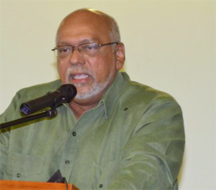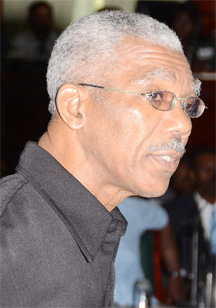President Donald Ramotar yesterday made a renewed bid to win APNU’s support for the Amaila Hydropower project but party Leader David Granger maintains that the venture cannot be supported in its present form.
A Partnership for National Unity (APNU) MP and finance spokesman Carl Greenidge, after hearing of the president’s bid, questioned Ramotar’s logic of expecting APNU to change its position just because he asked the party to do so.
Greenidge said that the position taken by APNU was “principled.” In relation to the president’s efforts to change the opposition’s mind, he said that the government “cannot simply ask the opposition to change their mind. There needs to be a change in the way the project is being done.”

Furthermore, Greenidge was skeptical that that there was any additional information that could be provided by government that would change the opposition’s mind. “The government has given all the information they want to give us. We have met with economists and technical experts who have also provided a lot of information on the project. If the president wants a change, then changes must be made to the way the project is being carried out. There is nothing that will be found tomorrow that has not already been revealed today,” Greenidge declared.
He said that if the government wants support for Amaila, then they must make changes which include bringing the project cost down, a guarantee in the contract that post-project tariff costs would be lower than the existing costs, and a developmental plan for the area.
Alliance for Change (AFC) Leader Khemraj Ramjattan yesterday was also skeptical of such a change and said that APNU would have to be “foolish” to change their mind so simply just four days after they said no.
In a statement yesterday, Ramotar shared that he had spoken with the Leader of the Opposition, Granger, and “urged him once again to join me in showing support for the Amalia Falls project.” The effort, Ramotar said, was made in light of the “small window” of time which existed for the country’s leaders to “rise to the occasion.”
Ramotar also said that the proposed developer Sithe Global’s “intention” to withdraw from the project was also a reason for consensus on the project. Sithe – the project’s developer – has already said it has exited the project so it is unclear why the president referred to an “intention” to withdraw.

Granger speaking to Stabroek News yesterday, said that the position demonstrated by APNU during Wednesday’s sitting of the National Assembly, when it voted against both the Amaila related bill and motion, remained unchanged.
He confirmed that the president called him yesterday morning asking for support for the project, but he said that he informed the president that though APNU was not opposed to hydropower for Guyana, the party was not convinced that the current arrangement under which the renewable energy was to be ushered in was in the best interest of the country.
An APNU press conference to be held today is expected to express these sentiments. Granger will be hosting the press conference and APNU MP Joseph Harmon says that the party’s position as it relates to Amaila will be reiterated.
Asked what the party can say that it has not already said on the project, Harmon told Stabroek News that serious statements which have been made must be addressed. Last Friday, Sithe exited the Amaila Falls project, and Harmon says that many persons seem to be of the opinion that APNU is at fault. Such a perception, Harmon said, cannot go unchallenged.
He said that the Guyanese people need to be reminded of the posture APNU has always had in relation to the project.
He also said that though various APNU members have pronounced on the position taken by the party before and during last Wednesday’s National Assembly sitting, the party has not officially addressed the matter. This, he said, will also be done today.
The Alliance for Change which had initially opposed the two Amaila measures voted with the government last Wednesday to pass them. Ramjattan has said that though the party has residual questions and concerns about the project, it did not want the project to die.
As such, Ramjattan said, the AFC’s decision to vote to pass the Amaila-related motion and bill was in an effort to give the project a new lease on life as opposed to letting it die. The party has since been criticised for this move, especially since it had indicated that it wanted its decision to be guided by results of a due diligence study currently being carried out by the Inter-American Development (IDB). The report on the study is to be released in October.
Asked if he is concerned that APNU’s hardline position against Amaila would trigger a backlash from party supporters, Granger restated that the position taken was a “principled” one, made after much thought and deliberation.
He said that meetings held with Sithe, the Guyana Power and Light, the Government, and visits to the site of the project all formed the basis of the decision to oppose the project in its current form.
He said that as far as he knows, the position taken by the party has found favour with its members, and added that he has seen nothing to suggest that its supporters are unsatisfied with it.
Ramotar nevertheless, stated his intention to “continue this engagement with Mr. Granger in the hours ahead, and I told him that my door remains open, as it has always been.” Granger also said that he has not closed off discussion with the president on hydropower.
In the statement, Ramotar noted what he referred to as the “volume of uninformed speculation that has been visible in recent weeks, despite two opportunities to debate the project in Parliament, and the public availability of information over many months.”
The President said that such matters, which are important to the country’s future, should be based on facts and not speculation or political partisanship. He also said that all political parties know that they have been provided with the information needed to reach a decision on Amaila; information which he says outlines a myriad of benefits.
Such benefits include a reduction of electricity generating costs from 19 cents per kW/h today, to 1.8 cents per kW/h after 20 years. This figure represents a 91% cost reduction.
Ramotar also said that once completed the project is expected to reduce electricity bills for Guyanese consumers and businesses as tariff levels are expected to go down by as much as 20%. Analyst Christopher Ram however, has argued that such a reduction may not occur.
Once Amaila comes on line, Ramotar said, the government of Guyana will no longer be required to subsdise GPL’s operations. The subsidy paid last year amounted to $6 billion. These finances, he said, can be invested in other sectors to assist in the country’s development. The project is also expected to reduce Guyana’s dependency on oil, the price of which is very difficult to predict.
Ramotar also said that the completion of the project can send a message to large global investors that Guyana is open for investment and set a new standard for the size of investment possible in Guyana.
Further, Ramotar said that Amaila will be fully owned by Guyana in twenty years from the time of completion and is expected to last for at least a hundred years as it continues to provide affordable, reliable energy.
The president said that though “one political party has yet to come out in support of our people gaining access to these benefits, in the coming hours and days, I hope that we will see a broadening spirit of patriotism and compassion for hardworking Guyanese. If we see this spirit of patriotism and compassion emerge, I will do my utmost as President to get this project back on track in the hours ahead, Ramotar said.




